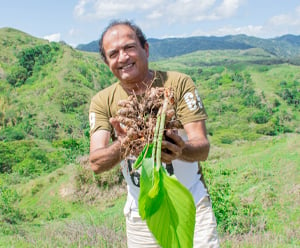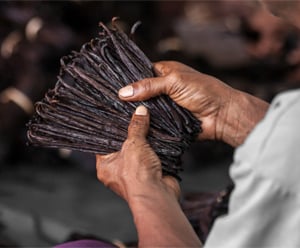
Organic Fijian turmeric is making its way into spice cabinets in the West

A “blessed” commodity — that is what Fiji’s wild-grown turmeric is to Indian-born entrepreneur Ashwin Khandhaliwala.
Such were the qualities of the fresh crop in Fiji that it convinced Khandhaliwala to build a business centered on the popular spice two years ago.
“Throw it in any type of soil and it will grow beautifully. Good conditions, such as the perfect climate and the untouched nature, contribute to the standard of turmeric in Fiji, which is the best I’ve seen so far,” explained the director of Fijian spice company Ashwin Export & Import.
Khandhaliwala, who previously ran a grocery business in Edison, New Jersey, knows a fair bit about spices from his extensive traveling to uncover the best produce around the world.
Before setting up shop in Fiji, he also worked with other companies on vegetables and organic exports for four years, right until the untapped potential of the island nation’s turmeric captured his imagination.
It proved to be an opportune time.
Turmeric has slowly built up a reputation in the West as the newest superfood, offering scientifically proven health benefits with its anti-inflammatory and antioxidant properties.
But where exactly does the spice come from, and how does it make its way into the sweet and savory delicacies halfway around the world?
From farm to table
Khandhaliwala’s company works closely with up to 120 local farmers from multiple villages across the interiors of western Fiji, including Niuoka village in Sigatoka and Navuniivi village in Rakiraki.
“To get good quality turmeric, we have to go to the interior parts of Fiji, approximately 230 to 270 kilometers from the main road. The journey is challenging but the outcome is very positive,” he said.
Taking five to six months to mature, the root crop — which grows well in all seasons — is carefully harvested by hand using garden tools.
The farmers will ride their horses into the mountains and use them to transport the fresh turmeric roots back to the villages, where they are sorted out.
Once validated and checked for quality, the crops are immediately sent to Ashwin Export’s warehouse to prepare for shipment within 24 hours to ensure freshness. “The longer fresh turmeric is left in the open, the lower the quality,” Khandhaliwala explained.
At the warehouse, the fresh turmeric roots have to undergo a thorough preparation process before it is ready for export. First weighed and washed, the crops are then dried, graded, and packed accordingly before undergoing a final bio inspection for quality.
“We usually inform the farmers to have the crops ready for collection on the eve of the flight’s departure. Processing and packing at our warehouse are then done overnight to have it ready for the flight the next day,” he shared.
Throughout the whole process from the farm to the warehouse, his team also has to ensure the right conditions during transit. “We’re dealing with fresh organic turmeric. It is our responsibility to ensure the whole process is chemical-free and not compromised or contaminated,” he said.
Bucking the trend
While those factors lie within his control, Khandhaliwala is not spared from the same issues plaguing most of Fiji’s exporters.
Due to the fall in air travel as a result of the Covid-19 pandemic, flight availability has been severely limited, leading to a surge in air freight rates.
There are almost no inbound flights while space is hard to come by on outbound flights, shared Khandhaliwala.
His company, which counts the United States and New Zealand as their key markets, relies on the air connectivity to ship the fresh crops to its destinations within the shortest possible time.
Thankfully, partnering with DHL Global Forwarding Fiji has helped Ashwin Export proceed with its shipments almost undisrupted. “We continue to work with our airline partners and terminal handling agents to check the availability of unit load devices and secure capacity on the limited flights out of Fiji,” said Ray Viegas, Country Manager, DHL Global Forwarding Fiji.
Unlike many of Fiji’s businesses that are struggling, Ashwin Export has managed to sustain, and even improve, its business.
Sales have soared nearly four times since the pandemic began, partly due to the spice’s perceived benefits in strengthening the immune system, which has become a key concern in the fight against the coronavirus.
“Companies like Ashwin Export are bucking the trend, and are thriving during the pandemic. Amid this challenging period, we will do our best to fulfill our responsibility as a reliable logistics provider to help businesses emerge from this pandemic better and stronger,” added Viegas.
Now, Khandhaliwala is already planning further ahead. The company is waiting on approval for its Safe Quality Food (SQF) and Hazard Analysis and Critical Control Point (HACCP) certifications, both of which will allow them to sell their organic produce to other markets internationally.
Once that comes true, Fijian turmeric could soon venture further, spicing up the diets of many more around the world.
MORE FROM THIS COLLECTION
















 English
English